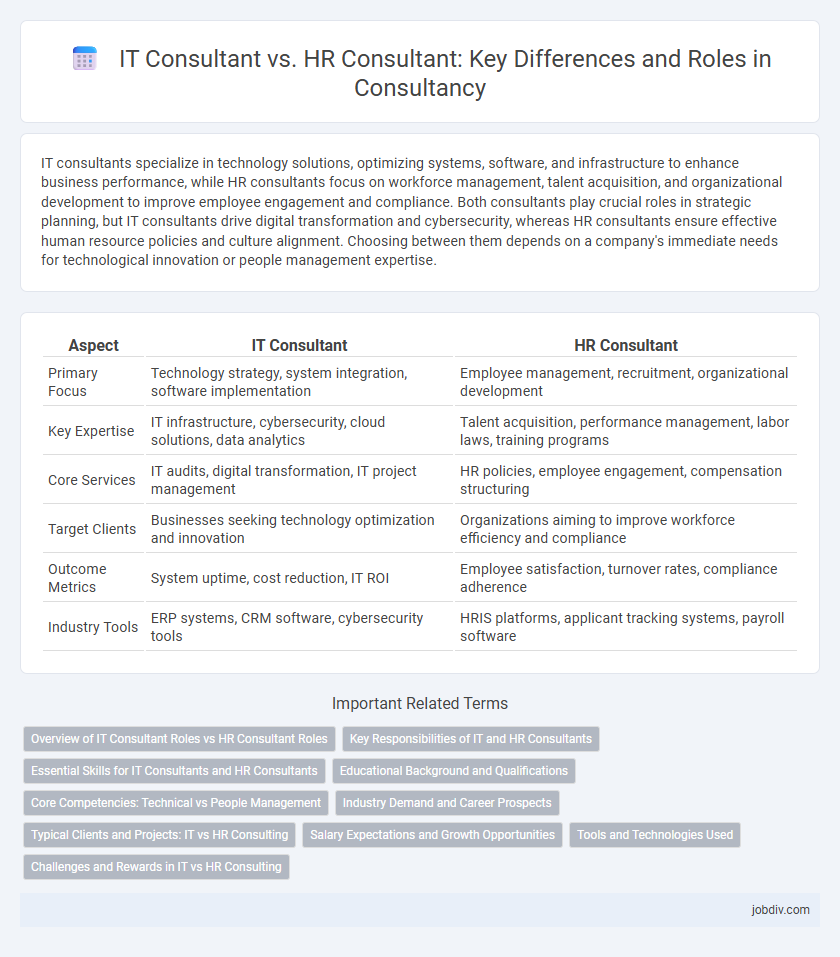IT consultants specialize in technology solutions, optimizing systems, software, and infrastructure to enhance business performance, while HR consultants focus on workforce management, talent acquisition, and organizational development to improve employee engagement and compliance. Both consultants play crucial roles in strategic planning, but IT consultants drive digital transformation and cybersecurity, whereas HR consultants ensure effective human resource policies and culture alignment. Choosing between them depends on a company's immediate needs for technological innovation or people management expertise.
Table of Comparison
| Aspect | IT Consultant | HR Consultant |
|---|---|---|
| Primary Focus | Technology strategy, system integration, software implementation | Employee management, recruitment, organizational development |
| Key Expertise | IT infrastructure, cybersecurity, cloud solutions, data analytics | Talent acquisition, performance management, labor laws, training programs |
| Core Services | IT audits, digital transformation, IT project management | HR policies, employee engagement, compensation structuring |
| Target Clients | Businesses seeking technology optimization and innovation | Organizations aiming to improve workforce efficiency and compliance |
| Outcome Metrics | System uptime, cost reduction, IT ROI | Employee satisfaction, turnover rates, compliance adherence |
| Industry Tools | ERP systems, CRM software, cybersecurity tools | HRIS platforms, applicant tracking systems, payroll software |
Overview of IT Consultant Roles vs HR Consultant Roles
IT Consultants specialize in analyzing and improving an organization's technology infrastructure, focusing on system integration, software development, and cybersecurity solutions. HR Consultants provide expertise in talent acquisition, employee relations, compliance, and organizational development to optimize workforce performance. Both roles require strategic problem-solving but differ fundamentally in their focus--technology systems versus human capital management.
Key Responsibilities of IT and HR Consultants
IT Consultants specialize in evaluating and implementing technology solutions, managing system integrations, and optimizing IT infrastructure to enhance organizational performance. HR Consultants focus on talent acquisition strategies, employee relations, compliance with labor laws, and designing effective workforce development programs. Both roles require expertise in their respective domains to drive business improvements, with IT Consultants addressing technological challenges and HR Consultants managing human capital effectively.
Essential Skills for IT Consultants and HR Consultants
IT consultants require proficiency in system analysis, cybersecurity, cloud computing, and software development, combined with strong problem-solving and project management skills. HR consultants excel in talent acquisition, employee relations, organizational development, and compliance with labor laws, supported by expertise in workforce analytics and communication. Both roles demand adaptability, strategic thinking, and client-focused advisory capabilities to address specialized business challenges effectively.
Educational Background and Qualifications
IT Consultants typically hold degrees in computer science, information technology, or related fields, often supplemented by certifications such as CISSP, PMP, or AWS Certified Solutions Architect. HR Consultants usually possess qualifications in human resources, business administration, or psychology, supported by certifications like SHRM-CP, PHR, or CIPD. These distinct educational backgrounds equip IT Consultants with technical expertise, while HR Consultants focus on workforce management and organizational development strategies.
Core Competencies: Technical vs People Management
IT consultants excel in technical competencies such as software development, system architecture, and cybersecurity, enabling them to optimize technological infrastructures and implement advanced IT solutions. HR consultants specialize in people management skills including talent acquisition, employee engagement, and organizational development, driving workforce productivity and enhancing corporate culture. The distinction in core competencies highlights IT consultants' focus on technical problem-solving, while HR consultants prioritize interpersonal communication and human capital strategies.
Industry Demand and Career Prospects
IT consultants experience high industry demand driven by rapid technological advancements, cloud computing, and cybersecurity needs, offering strong career prospects with competitive salaries and opportunities for specialization. HR consultants remain essential in organizational development, talent management, and compliance, benefiting from steady demand due to evolving workforce dynamics and regulatory changes. Career growth for HR consultants often involves strategic roles in change management and employee engagement, while IT consultants leverage skills in emerging technologies to advance in consultancy firms or internal corporate roles.
Typical Clients and Projects: IT vs HR Consulting
IT consultants typically work with technology-driven organizations such as software companies, financial institutions, and healthcare providers, focusing on projects like system integration, cybersecurity enhancements, and cloud migration. HR consultants serve a broad range of industries including manufacturing, retail, and education, specializing in talent acquisition strategies, employee engagement programs, and compliance with labor regulations. Both roles address distinct client needs by leveraging expertise in either technological solutions or human capital management.
Salary Expectations and Growth Opportunities
IT consultants typically command higher salary expectations due to specialized technical skills and growing demand in digital transformation projects, with average annual earnings ranging from $85,000 to $120,000 depending on experience and industry. HR consultants often earn between $60,000 and $90,000, benefiting from steady growth driven by organizational development and talent management needs in various sectors. Growth opportunities for IT consultants are robust, including roles in cybersecurity and cloud computing, while HR consultants can advance into strategic leadership positions focusing on workforce planning and employee engagement.
Tools and Technologies Used
IT consultants leverage advanced tools such as cloud platforms (AWS, Azure), network security software, and data analytics frameworks like Power BI to optimize technology infrastructure. HR consultants utilize human resource management systems (HRMS) like SAP SuccessFactors, Workday, and applicant tracking systems (ATS) to streamline recruitment and employee performance management. Both roles rely on collaborative technologies such as Microsoft Teams and Slack for seamless communication and project coordination.
Challenges and Rewards in IT vs HR Consulting
IT consultants face rapid technological changes and cybersecurity threats, requiring continuous skill updates and problem-solving under pressure, while HR consultants navigate complex organizational behavior, employee relations, and compliance with labor laws. The rewards in IT consulting include driving innovation and improving system efficiencies that directly impact business operations, whereas HR consultants gain fulfillment from enhancing workplace culture and workforce productivity. Both roles demand strong communication and analytical skills but differ in their focus on technical infrastructure versus people management challenges.
IT Consultant vs HR Consultant Infographic

 jobdiv.com
jobdiv.com